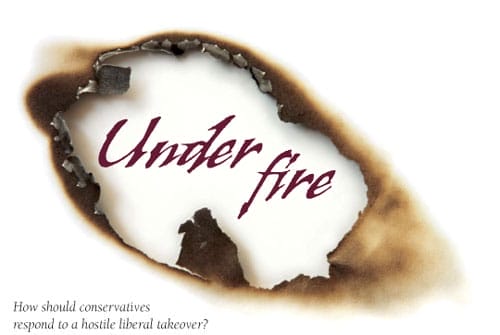By Richard Esenberg
In 1964, historian Richard Hofstadter described what he called the “the paranoid style” in American politics—an affliction most often associated with the right. It consisted, in his view, of “angry minds” indulged in “heated exaggeration, suspiciousness, and conspiratorial fantasy.” The politically paranoid believe themselves to be faced with “totally evil and totally unappeasable” opponents who must “be totally eliminated.”
Hofstadter conceded that the paranoia he thought he could see was not limited to the right, and perhaps he can be excused from the assumption that it is conservatives who most often demonize the other. No one had heard of the netroots. Michael Moore was 10 years old. Howard Dean was still prepping at St. George’s.
“Heated exaggeration” and the tendency to see the other side as “totally evil” can also be found on the port side of our politics. Recently, noted neurophysiologist and actress Janeane Garafolo advanced the theory that conservatism is a product of an excessively large limbic brain. To be a conservative, says the star of Reality Bites, is to be a dick. Charming.
Of course, no one—at least outside of Minnesota—ought to confuse a comedian with a political leader, but this is a taste that runs deep among our friends on the left. In Wisconsin, State Reps. Mark Pocan (D-Madison) and Pedro Colon (D-Milwaukee) warned that concerns about same-sex marriage and unenforced immigration laws are nothing more than an appeal to the “Bubba” vote.
I am not sure who “the Bubbas” are, but I understand that I should not want to be one.
On a national level, a loosely worded report from the Department of Homeland Security speculated, although there was no evidence, that right-wing “extremists” (described as groups who are “antigovernment” or “dedicated to a single issue, such as opposition to abortion or immigration”) could be planning violence. Who knows? They should be watched.
As the recent murder of abortionist George Tiller demonstrates, any lunatic may believe his crime is in service of a higher cause. But the report’s sweeping suspicion of “conservatives” is indistinguishable from a claim that “Muslims” could be planning violence. Yet Homeland Security Secretary Janet Napolitano felt free to defend the report.
This type of overt vilification (and the more common subtle cultural marginalization) flows from the fact that our chattering classes and beautiful people are not conservatives and don’t know any conservatives. They can’t imagine why anyone who went to a top-shelf school or has been on the money side of a rope line would ever want to be one.
Indeed, in broad swaths of our common culture, there is a presumption that conservatives are just not cool. We can expect a fresh onslaught of this thinking. Conservatives are not in power, and Barack Obama, although given to wax pretty about unity and dialogue, is almost certainly to the left of any president since FDR.
Unity seems to mean universal recognition that he is right and a dialogue consists of a condescending “compassion” toward those who “cling to God and guns.”
Political hyperventilation and a lack of civility are not limited to the left. But don’t look for me to knock myself out in an effort at evenhandedness. When I sit down with the Sunday New York Times, it is Frank Rich, not David Brooks, who feels free to take snarky racial shots, calling the GOP a party led by “Pillsbury doughboys.”
And for every novel or movie that affirms some traditional institution or value, there are 20 that adopt a “courageously” transgressive stance toward corporations (other than those in media or entertainment), organized religion and traditional families.
My purpose here is to offer a few modest suggestions of how conservatives ought to respond. There are, I think, two traps to avoid.
The first is to become excessively insular. We can retreat into a world where everything is as it should be, and our present predicament is nothing more than rotten luck—poor marketing, a bad economy and the apostasy of the GOP Congress. This is how Democrats reacted to the election of Ronald Reagan. It did not go well.
The second would be to become overly apologetic and assimilate ourselves to what we think is the new Zeitgeist. We would abandon our outmoded affinities for traditional values and, as Joe Biden put it, get with the “patriotic” program of high taxes and huge government.
But if conservatism stands for anything, it is for personal responsibility and the way in which the “subsidiary” institutions of our society—the family,
the church, voluntary associations and the private sector—encourage and facilitate its exercise. It is skeptical about grandiose designs to remake the world and wary of the perils of unintended consequences.
It is our burden to adhere to first principles while the ridicule of the cognoscenti is buttressed by electoral success. But we need to think about what they mean today. While conservatism in 2009 certainly can’t resemble the liberalism of 1979 on offer from Obama and the Democrats, it is these underlying principles—and not their particular application in 1980—that are important.
No surrender, but no stagnation.
Richard Esenberg, a visiting assistant professor of law at Marquette University, blogs at http://www.sharkandshepherd.blogspot.com/





